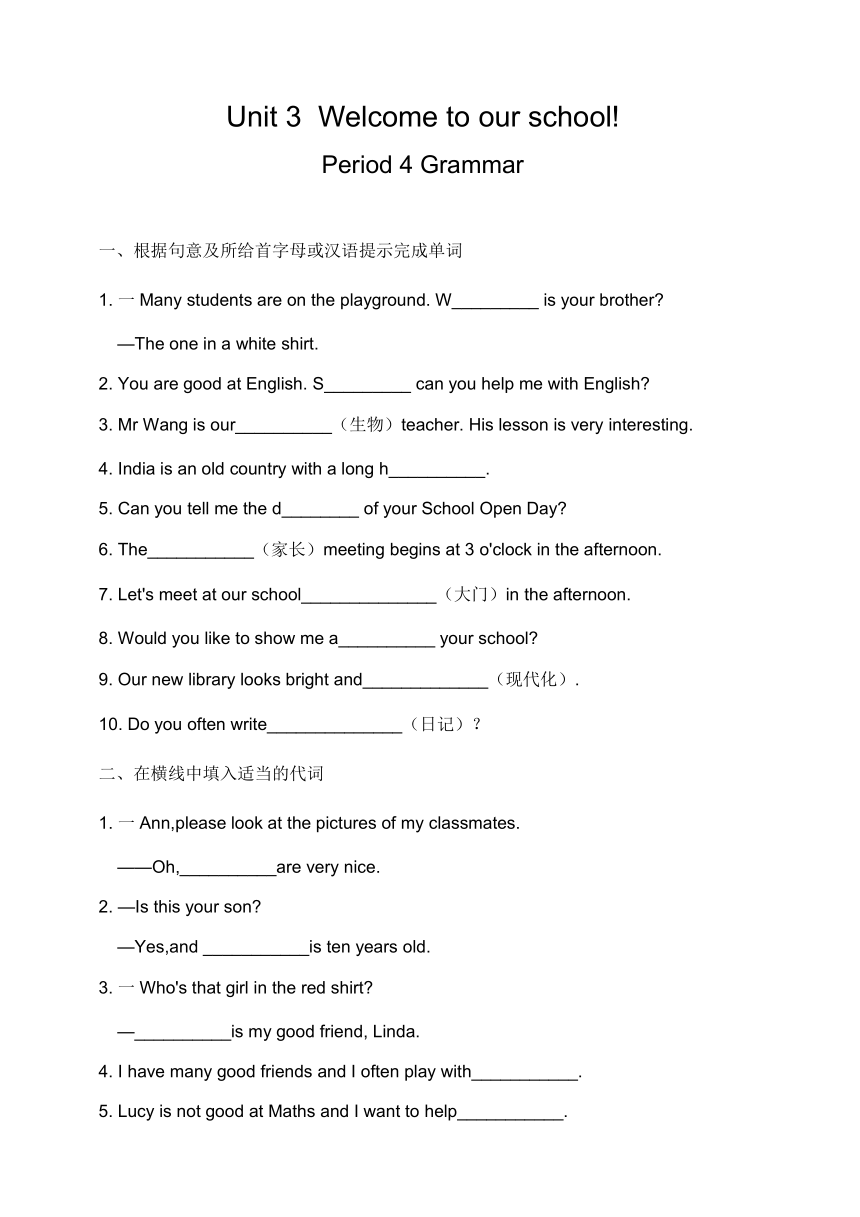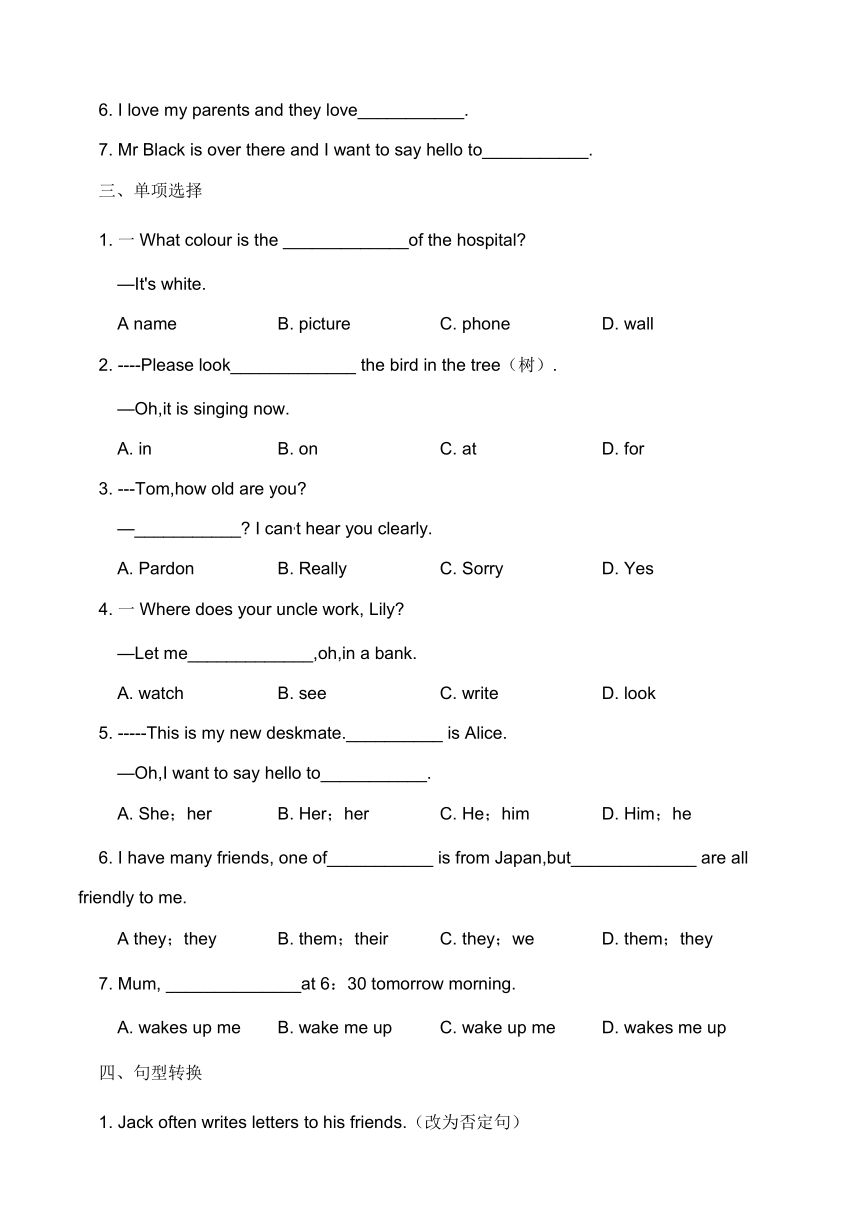Unit3 Welcome to our school Period4 Grammar 课时周练(含答案)牛津译林版七年级英语上册
文档属性
| 名称 | Unit3 Welcome to our school Period4 Grammar 课时周练(含答案)牛津译林版七年级英语上册 |  | |
| 格式 | docx | ||
| 文件大小 | 121.6KB | ||
| 资源类型 | 教案 | ||
| 版本资源 | 牛津译林版 | ||
| 科目 | 英语 | ||
| 更新时间 | 2024-06-03 18:39:39 | ||
图片预览


文档简介
Unit 3 Welcome to our school!
Period 4 Grammar
一、根据句意及所给首字母或汉语提示完成单词
1. 一Many students are on the playground. W_________ is your brother
—The one in a white shirt.
2. You are good at English. S_________ can you help me with English
3. Mr Wang is our__________(生物)teacher. His lesson is very interesting.
4. India is an old country with a long h__________.
5. Can you tell me the d________ of your School Open Day
6. The___________(家长)meeting begins at 3 o'clock in the afternoon.
7. Let's meet at our school______________(大门)in the afternoon.
8. Would you like to show me a__________ your school
9. Our new library looks bright and_____________(现代化).
10. Do you often write______________(日记)?
二、在横线中填入适当的代词
1. 一Ann,please look at the pictures of my classmates.
——Oh,__________are very nice.
2. —Is this your son
—Yes,and ___________is ten years old.
3. 一Who's that girl in the red shirt
—__________is my good friend, Linda.
4. I have many good friends and I often play with___________.
5. Lucy is not good at Maths and I want to help___________.
6. I love my parents and they love___________.
7. Mr Black is over there and I want to say hello to___________.
三、单项选择
1. 一What colour is the _____________of the hospital
—It's white.
A name B. picture C. phone D. wall
2. ----Please look_____________ the bird in the tree(树).
—Oh,it is singing now.
A. in B. on C. at D. for
3. ---Tom,how old are you
—___________ I can,t hear you clearly.
A. Pardon B. Really C. Sorry D. Yes
4. 一Where does your uncle work, Lily
—Let me_____________,oh,in a bank.
A. watch B. see C. write D. look
5. -----This is my new deskmate.__________ is Alice.
—Oh,I want to say hello to___________.
A. She;her B. Her;her C. He;him D. Him;he
6. I have many friends, one of___________ is from Japan,but_____________ are all friendly to me.
A they;they B. them;their C. they;we D. them;they
7. Mum, ______________at 6:30 tomorrow morning.
A. wakes up me B. wake me up C. wake up me D. wakes me up
四、句型转换
1. Jack often writes letters to his friends.(改为否定句)
Jack________often__________ letters to his friends.
She swims well.(改为同义句)
She's__________ __________ ___________.
He goes to the Maths Club every Tuesday and Thursday.(改为 复数句)
___________ ___________ to the Maths Club every Tuesday and Thursday.
We have two blackboards on the walls.(改为同义句)
_________ __________ two blackboards on the walls.
She does a lot of homework every day.(改为否定句)
She _______ __________a lot of homework every day.
Jim has dinner at school on Tuesday.(改为一般疑问句)
_______Jim_________ dinner at school on Tuesday
五、根据中文意思完成句子,每空一词
1.他把那幅画贴在墙上。
He puts up the picture_________ ________ _________.
2.下课后你打算干什么?
What do you plan to do________ _________
3.丹尼在家还是在学校?
Is Danny ___________ ___________or at school
4.有时候我听不清任何东西。
____________ I can't hear anything clearly.
5.我正和贝蒂在电话里聊天。
I am talking with Betty________ ___________ _________.
6.请代我向你的朋友问好。
Please ________ _____________ ___________your friend for me.
让我想想。
_______ _________ ________.
再说一遍好吗?我没听清楚你说的话。
________ I didn't hear you clearly.
六、完形填空
Every year students in many countries learn English. 1 of these students are children, and the other students are young people. Why do all these people want to learn 2 It is not 3 to answer this question. Many boys and girls learn English at school. It is one of their 4 . Many people learn English because it is 5 in their work. Some young people learn English 6 their higher studies because some of their books are 7 English. Other people learn English because they want to 8 newspapers in English. Some people learn English because they want to 9 in the USA, England or Australia. English is very 10 in our life.
1. A. Each B. Lot C. Some D. Much
2. A. English B. Chinese C. Maths D. Japanese
3. A. hard B. easy C. good D. nice
4. A. books B. classes C. schools D, subjects
5. A. good B. fine C. useful D. pleased
6. A for B. of C. to D. from
7. A. in B. with C. at D. of
8. A. look B. see C. look at D. read
9. A. go B. work C. like D. come
10. A help B. helping C. helpful D. helps
Period 4 Grammar
一、根据句意及所给首字母或汉语提示完成单词
1. 一Many students are on the playground. W_________ is your brother
—The one in a white shirt.
2. You are good at English. S_________ can you help me with English
3. Mr Wang is our__________(生物)teacher. His lesson is very interesting.
4. India is an old country with a long h__________.
5. Can you tell me the d________ of your School Open Day
6. The___________(家长)meeting begins at 3 o'clock in the afternoon.
7. Let's meet at our school______________(大门)in the afternoon.
8. Would you like to show me a__________ your school
9. Our new library looks bright and_____________(现代化).
10. Do you often write______________(日记)?
二、在横线中填入适当的代词
1. 一Ann,please look at the pictures of my classmates.
——Oh,__________are very nice.
2. —Is this your son
—Yes,and ___________is ten years old.
3. 一Who's that girl in the red shirt
—__________is my good friend, Linda.
4. I have many good friends and I often play with___________.
5. Lucy is not good at Maths and I want to help___________.
6. I love my parents and they love___________.
7. Mr Black is over there and I want to say hello to___________.
三、单项选择
1. 一What colour is the _____________of the hospital
—It's white.
A name B. picture C. phone D. wall
2. ----Please look_____________ the bird in the tree(树).
—Oh,it is singing now.
A. in B. on C. at D. for
3. ---Tom,how old are you
—___________ I can,t hear you clearly.
A. Pardon B. Really C. Sorry D. Yes
4. 一Where does your uncle work, Lily
—Let me_____________,oh,in a bank.
A. watch B. see C. write D. look
5. -----This is my new deskmate.__________ is Alice.
—Oh,I want to say hello to___________.
A. She;her B. Her;her C. He;him D. Him;he
6. I have many friends, one of___________ is from Japan,but_____________ are all friendly to me.
A they;they B. them;their C. they;we D. them;they
7. Mum, ______________at 6:30 tomorrow morning.
A. wakes up me B. wake me up C. wake up me D. wakes me up
四、句型转换
1. Jack often writes letters to his friends.(改为否定句)
Jack________often__________ letters to his friends.
She swims well.(改为同义句)
She's__________ __________ ___________.
He goes to the Maths Club every Tuesday and Thursday.(改为 复数句)
___________ ___________ to the Maths Club every Tuesday and Thursday.
We have two blackboards on the walls.(改为同义句)
_________ __________ two blackboards on the walls.
She does a lot of homework every day.(改为否定句)
She _______ __________a lot of homework every day.
Jim has dinner at school on Tuesday.(改为一般疑问句)
_______Jim_________ dinner at school on Tuesday
五、根据中文意思完成句子,每空一词
1.他把那幅画贴在墙上。
He puts up the picture_________ ________ _________.
2.下课后你打算干什么?
What do you plan to do________ _________
3.丹尼在家还是在学校?
Is Danny ___________ ___________or at school
4.有时候我听不清任何东西。
____________ I can't hear anything clearly.
5.我正和贝蒂在电话里聊天。
I am talking with Betty________ ___________ _________.
6.请代我向你的朋友问好。
Please ________ _____________ ___________your friend for me.
让我想想。
_______ _________ ________.
再说一遍好吗?我没听清楚你说的话。
________ I didn't hear you clearly.
六、完形填空
Every year students in many countries learn English. 1 of these students are children, and the other students are young people. Why do all these people want to learn 2 It is not 3 to answer this question. Many boys and girls learn English at school. It is one of their 4 . Many people learn English because it is 5 in their work. Some young people learn English 6 their higher studies because some of their books are 7 English. Other people learn English because they want to 8 newspapers in English. Some people learn English because they want to 9 in the USA, England or Australia. English is very 10 in our life.
1. A. Each B. Lot C. Some D. Much
2. A. English B. Chinese C. Maths D. Japanese
3. A. hard B. easy C. good D. nice
4. A. books B. classes C. schools D, subjects
5. A. good B. fine C. useful D. pleased
6. A for B. of C. to D. from
7. A. in B. with C. at D. of
8. A. look B. see C. look at D. read
9. A. go B. work C. like D. come
10. A help B. helping C. helpful D. helps
同课章节目录
- 预备课程
- Lesson 1 Nice to meet you !
- Lesson 2 A happy family
- Lesson 3 A nice school
- Lesson 4 You look cool !
- Lesson 5 Wonderful things
- Lesson 6 Have nice food
- Lesson 7 Enjoy our days
- Lesson 8 Let's have fun !
- Unit 1 This is me
- Unit 2 Let's play sports
- Unit 3 Welcome to our school
- Unit 4 My day
- Unit 5 Let’s celebrate
- Unit 6 Food and lifestyle
- Unit 7 Shopping
- Unit 8 Fashion
